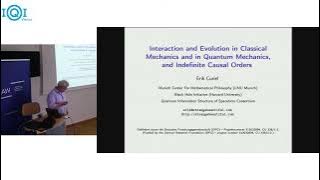Interaction and Evolution in Classical Mechanics and in Quantum Mechanics, and Indefinite Causal Orders

One gets for free, moreover, a characterization of "free" evolution (or "isolation"). This is not the case in Hamiltonian and quantum mechanics. Along the way, I point out that the theorems allow one to entirely reconstruct the full 4-dimensional spacetime structure of Newtonian physics from classical dynamics, again in a way not possible in quantum theory. Thus, it is also the case that the dynamics of quantum theory needs to be hooked up to background spacetime structure "by hand" in a way not required in classical mechanics. I conclude by discussing what I take to be the lessons for all this with regard to the Measurement Problem: not only is the idea of "measurement" problematic in quantum theory, but the entire idea of "interaction" per se in quantum theory is more deeply problematic than has been recognized. I argue that the conceptual situation as I have laid it out provides a natural and possibly fruitful way to formulate and work with the idea of indefinite causal orders, and possibly to hook it up in a natural way with the idea of quantum reference frames.
Information
Speaker: Erik Curiel (Munich Center for Mathematical Philosophy [LMU Munich], Black Hole Initiative, Harvard)

